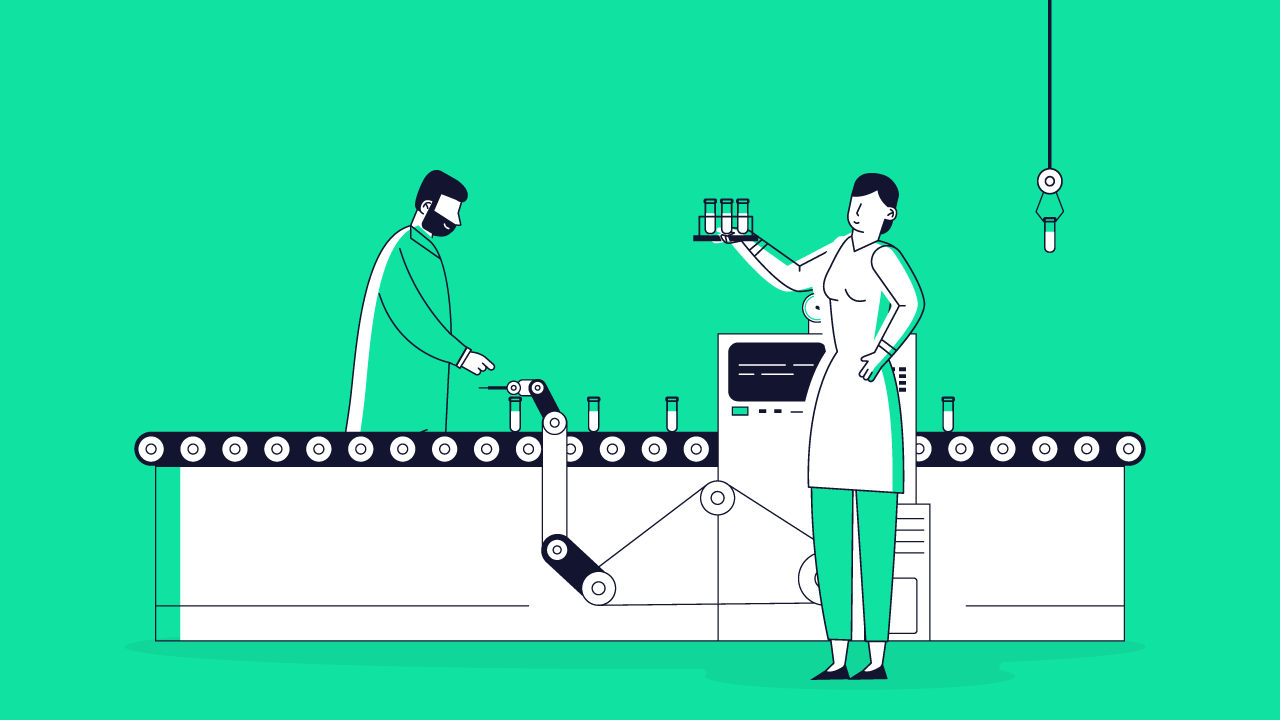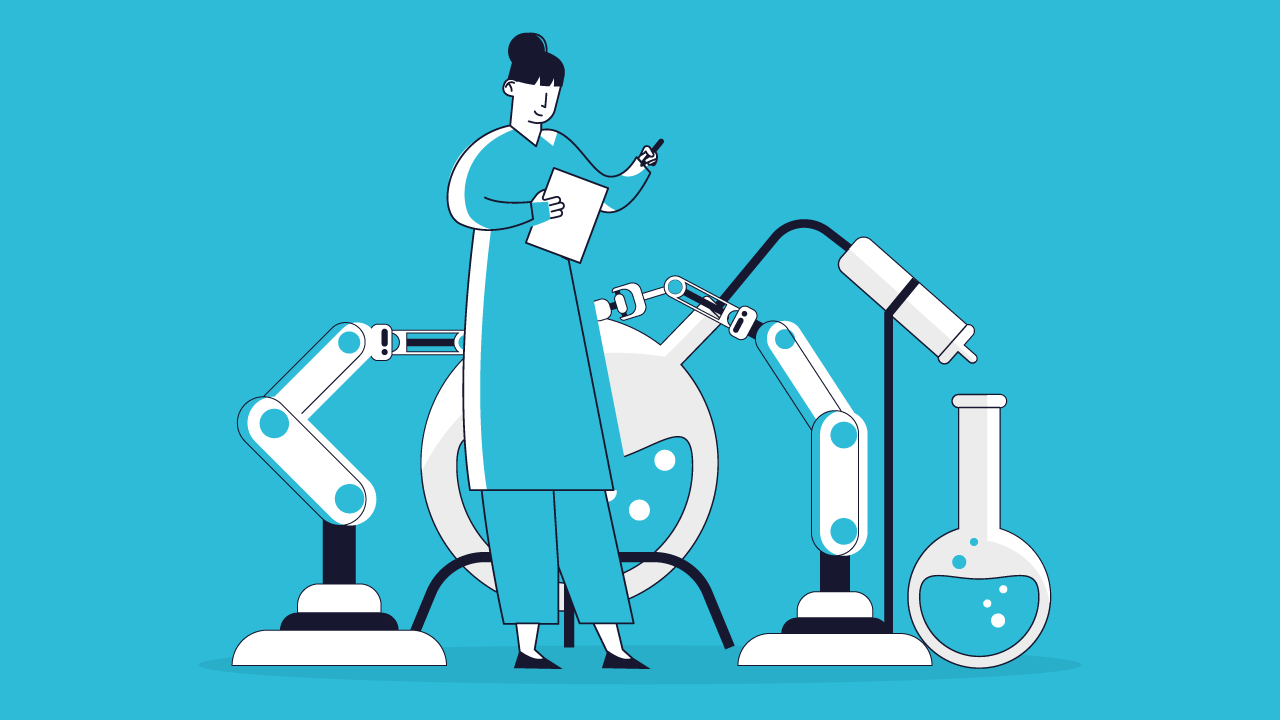Latest News
Trends in biomanufacturing and the skillsets required to address them
22 Jan, 20246 MinutesOne of a plethora of fields being impacted heavily by the changing life science landscape is...

One of a plethora of fields being impacted heavily by the changing life science landscape is biomanufacturing. As tech advances, regulations shift, and the push towards more personal and quick-to-market medicine accelerates, the biomanufacturing field stands at the forefront of some of the biggest changes in the life sciences sector.
For those leading teams or involved in the hiring of new talent, this is both a challenge and an opportunity. The challenge is to continuously adapt talent acquisition strategies to meet these new demands. The opportunity? To shape a workforce that meets today's requirements, the requirements of any partners you work with, and build a team poised to tackle tomorrow's challenges.
The latest trends in the biomanufacturing industry mean that the skillsets vital for professionals to thrive are changing. Whether it's understanding the intricacies of cutting-edge technologies or encouraging your teams to be collaborative and adaptable, the goal is to be equipped with the right tools and talents to stay ahead.
The major trends impacting biomanufacturing.
From tech to sustainability, the recent trends shaping this field are redefining how we approach the production of biological products. Each comes with its own learning opportunity, and impact on current and future talent.
Advancements in Technology
The biomanufacturing sector is witnessing a surge in innovative technologies, and traditional methods of product manufacturing are becoming increasingly enhanced with tech. Notably you’ve got CRISPR, a groundbreaking gene-editing technology that has vast and positive implications for drug development, but poses complexities for manufacturing in line with cGMP principals—CDMO RoslinCT announced a partnership to support in the production of the treatment in the UK.
You’ve also got the integration of artificial intelligence and machine learning, which continues to be echoed across drug discovery, with promises to make the process faster and more efficient. These technological advancements are reshaping product development whilst setting new standards for manufacturing efficiency and precision.
Personal Medicines
This adoption and application of tech has ushered in the move towards personal medicine, which is another trend transforming biomanufacturing. Tailoring treatments to individual patient's genetic profiles is becoming more prevalent, moving the focus from mass-produced pharmaceuticals to more individual approaches.
This demands a balance of precision in production and flexibility in manufacturing processes to accommodate the unique requirements of one-on-one treatments for individual needs.
Sustainability and Green Manufacturing
Global attention is shifting towards sustainable practices. Over the last few years several major players like J&J, AbbVie and Pfizer have made new pledges to make the production of their treatments more environmentally-friendly, including the introduction of initiatives specifically around greener manufacturing, waste management and exploring of more renewable energy sources.
Sustainability is becoming a core component of modern biomanufacturing, creating a better world for us to live in, but from a commercial aspect it’s directly impacting share prices and heavily influencing consumer behaviour. Because of this, we see many firms actively publishing the progress on their efforts to be greener. GSK is one such example, who publish their ESG Performance Report annually.
Regulatory Landscape
With brand new technologies and brand new approaches, the regulatory landscape in biomanufacturing is also evolving. The FDA, for example, released their perspective on Industry 4.0, which merges traditional manufacturing techniques with more advanced technologies.
There’s a continuous need to comply with these emerging guidelines and standards, standards that are in place to make sure that companies who take advantage of the latest technologies and explore new avenues of research still create products that are viable. Staying on top of these regulatory changes is crucial for maintaining compliance and avoiding delays or setbacks in production.
Essential skills for modern biomanufacturing.
As the biomanufacturing field evolves, so do the skillsets of the professionals in the space. Now, a diverse range of skills is necessary within manufacturing and wider tech ops teams in order to meet new demands.
Technical Expertise
A deep understanding of biomanufacturing processes remains foundational. This includes knowledge of cell culture, protein purification, and quality assurance protocols. However, technical expertise now also extends to newer areas like gene editing and cell therapy, where—as seen in this video from Vertex—complexities such as the use of live cells have to be navigated.
Professionals need to be adept in both the traditional aspects of biomanufacturing and emerging technological innovations.
Data Analysis and Digital Literacy
The influx of digital technologies into biomanufacturing has made data analysis skills increasingly important. With firms investing in tools that enable real-time monitoring, data analytics, automation, and advanced modelling, those in the field would benefit from being able to interpret complex datasets and apply these insights to improve processes and outcomes.
It’s also increasing opportunities to work more closely with data and tech teams, as interdisciplinary collaboration becomes more essential for success in drug development.
Regulatory and Compliance Acumen
With a constantly evolving regulatory landscape, professionals in biomanufacturing must have a thorough understanding of current compliance standards and regulatory requirements. This knowledge is crucial for ensuring product safety and for streamlining the approval process and bringing products to market more efficiently.
Soft Skills
While technical skills are crucial, soft skills are equally important. Communication skills are essential for effectively collaborating with cross-functional teams, such as tech and data science, and for explaining complex biomanufacturing processes to non-specialists.
Adaptability is also key, as professionals must be able to adjust to new technologies and shifting industry trends, as are problem-solving skills.
Bridging the gap between trends and skills.
As the biomanufacturing industry evolves, a gap has emerged between the current skillsets of the workforce and those required to meet new industry standards and trends, and bridging this gap is crucial.
If you're involved in the hiring process, you should begin by refining your talent acquisition process. This involves not just seeking candidates with the right technical skills, but also those who show adaptability, a willingness to learn, and a strong foundation in digital literacy. Using tools and interview techniques that identify skills and potential, rather than just experience, can help in identifying candidates who are more likely to thrive in today’s biomanufacturing environment.
You should look into tech-enabled candidate screening tools, skills assessment platforms, behavioural assessment tools and even social media or professional network analysis tools to provide insight into their interests and peer recognition. These tools, when used effectively, can your ability to identify and assess candidates who have the required technical and soft skills, and of course, should be paired with a suitable ATS to store and re-generate the candidates you speak with.
Getting candidates through the door is one thing, and retaining and upskilling your own team is another. Continuous investment in learning and development to ensure your teams remain technically versed and able to thrive in the changing biomanufacturing landscape is equally important. Continual L&D through the likes of workshops, seminars, courses in digital tools and hands-on training should be part of your retention strategy.
Looking forward
With rapid shifts driven by technological advancements, regulatory changes, and new market demands, comes increased pressure on hiring managers and those involved in the hiring process. Understanding these changes and the corresponding skillsets is essential to remain ahead.
Those that embrace a proactive approach to talent and effectively source and screen for these changing requirements will naturally come out on top. This involves assessing the suitability of your current sourcing and screening efforts for the skillsets of 2024 and beyond, but also looking at the training and upskilling opportunities you provide to existing employees that mean they’re able to develop and seek to be retained.
For support in developing and executing strategies for access to top biomanufacturing talent, reach out to Bradley Dean from our technical operations team. More information on how we support those in the CDMO space can be found here.



